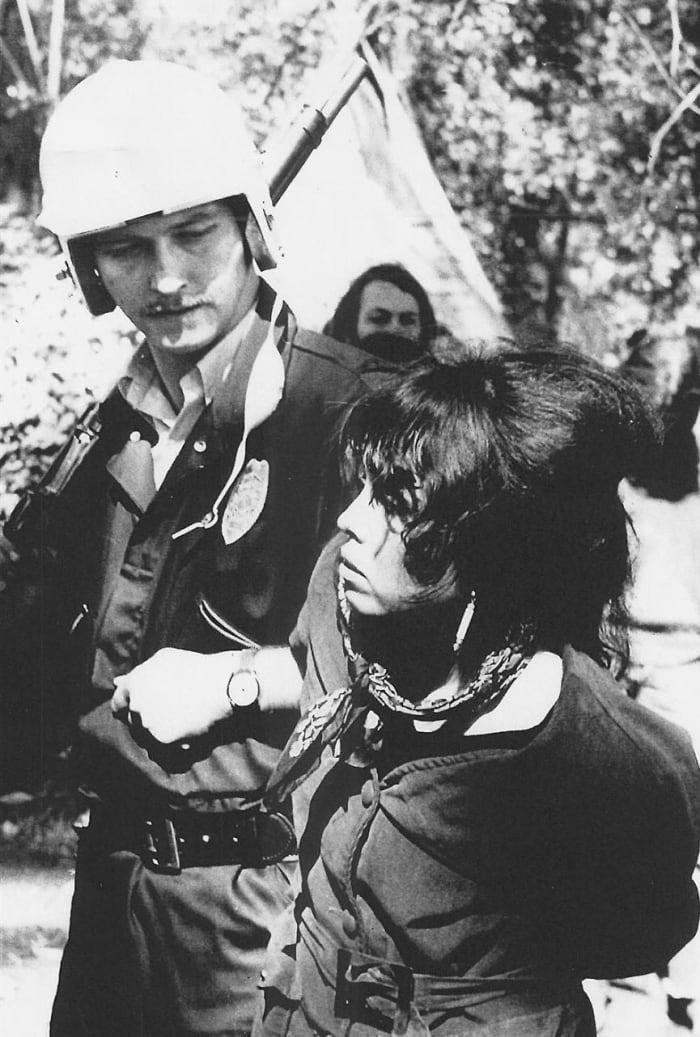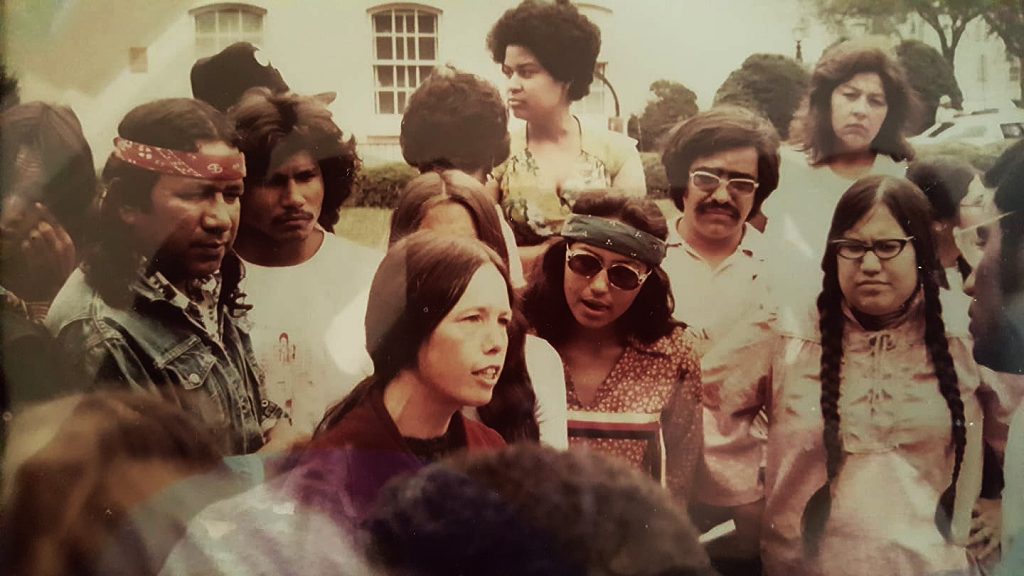From ‘Indian Center News’, Published by the American Indian Women’s Service League, Inc, September 1970, Seattle, Washington
By Ramona Bennett, Puyallup Reservation Council
Eighty years ago, this area was a paradise of rich trees, rich beaches, rich rivers, plentiful hunting, and people with a rich culture. As the white population increased… the wealth of the Indian people decreased with it. When the treaties were signed, we were a rich and sharing people, and we thought there would always be plenty to share. The men from Boston were few and it didn’t appear they could alter our life-style to any great degree. The white man’s diseases decreased our population radically. Their population was on the rise and they put a statue in a harbor INVITING all the infirm, incompetent, social misfits from Europe to come and share our countries’ wealth. They came…. in numbers. They paved and polluted every inch of land and air they had contact with. As surely as they destroyed our mother earth, they destroyed her children.
Our people gathered, hunted, fished and preserved foods for about three months out of the year. The balance of the year was free to spend developing a most advanced culture. Family ties were deep and the government realized that this was the fiber of our society so the first destructive step against us was to gather our children and send them as far away from home as possible for a civilizing education.
“Civilizing” means cultural death to people with deep roots. Our people can’t really assimilate… we aren’t the same. We were pushed into the melting pot and we stuck to the sides and sunk to the bottom. Our value system is different, people will always be more important than possessions and old things will always be treasured instead of replaced. The Bureau of Indian Affairs relocated thousands of Indian families, only to find out that they all find their way home when there are roots to gather or horses to break. Indian people are different.…
The money spent on relocation programs could have gone toward developing on-reservation programs so our people could stay “home” in comfort and dignity, if the anglo society had not been more interested in taking our land base than really improving the Indian standard of living.
My tribe is the Puyallup tribe. This land base was located from Stillacum to Duwamish, but centrally where the City of Tacoma now exists. The prime real estate originally held by this tribe explains better than I can say why so much has happened to these particular people.
We have a Presbyterian Church in the middle of our cemetery that was awarded to the faith by an act of Congress so this sect could “civilize the savages”. We are allowed to rent the church each week, so we can have Indian Dance classes. The agencies that “serve” the Indian have administered us out of the 219,000 acres originally assigned by treaty. Our other treaty rights were the right to hunt and the right to fish. The right to hunt in downtown Tacoma is a bit of a lost cause. Now we are down to the right to take fish.
We fish under the Treaty of Medicine Creek, 1854. The State has not sufficiently protected the fish resource, the spawning grounds have been ruined in most cases, either by dams or by careless logging too near the water edge. In the case of the Puyallup River the power project let the
water level get too low at one point and killed all of the spawned eggs. The power project received a slap on the wrists and tiny fine, but the fish shortage was blamed on the Indians again in a most Hitleristic manner.
Washington State Department of Fisheries has an injunction against our Tribe that tells us we can’t fish in our river because the fish are necessary for conservation purposes. We contend that State courts don’t have the authority to make these kind of decisions and the burden of proof was the fisheries department’s responsibility and the necessity for conservation was never REALLY established. The fisheries department tells us that they can’t restrict the sports and commercial fishermen because they can’t determine which fish are headed for our river. (Indian fishing is being regulated on all usual and accustomed rivers).
When an Indian fisherman is arrested he is charged with violating the injunction, not the actual fishing. This is probably because the courts can state for certain that there is an injunction, but can’t say for certain that Indians do not have the right to fish. We have now questioned whether it is legal to prosecute an individual under an in junction, that was filed against the tribe. Since that question has come up they have changed and are now charging our people with “obstructing” an officer.
After nineteen years of litigation and arrest and frequent abuse our people have their backs to the river. We have no place to go. Fishing is firmly a part of our culture here on the coast. Coast songs, dances, carving, drawing, diet, religion and social structure all reflect the fish’s importance to our people. We found in our fishing camp a new feeling for each other. We are a family. Our young people who have never met, heard about our camp and came down. They got to know each other and watched the fishermen. They started out shaking out a net and end up on the river together fishing, as their fathers and the people before them have for thousands of years.
When a tribe’s land base is lost through a growing white population and all treaty rights are denied there is no need to worry about termination. The tribe ceases to function as a family and has nothing the government is interested in taking away from them.
We of the Puyallup Tribe are not alone on that river. All coast tribes are with us whether they realize it or not. If the state takes from us the right to take fish, a dangerous precedent will be set and all of the coast tribes can expect the same sort of treatment. We have armed ourselves for the protection of our fishermen as a last resort.
On the last day of the fishing treaty right, we know the other tribes will do the same, some next year and some in fifty years. We hope the Indian community will try to understand our situation and will assist us. Help is needed in many ways in our camp and in outside communities. We plan on maintaining a camp through the month of November this year and every year until this legal problem is settled.
In Seattle please call ME 2 1557. In Tacoma, call BR 2 9962.
Survival of the American Indian, Tacoma.

Ramona Bennett, Puyallup territory fish-in, Tacoma, 1970
Also
The Sea-Serpent, by Tekahionwake (1911)
Nisqually Proclamation or “Statement of Facts” (1965)
The Last Indian War, by Janet McCloud (1966)
Is the Trend Changing?, by Laura McCloud (1969)
Native Alliance for Red Power – Eight Point Program (1969)
Capitalism, the Final Stage of Exploitation, by Lee Carter (1970)
Bobbi Lee Indian Rebel, by Lee Maracle (1975/1990)
Proclamation of the Puyallup Tribe on the Repossession of the Cushman Indian Hospital Lands (1976)
The Lost Days of Columbus, by Lee Maracle (1992)
Sovereignty, by Monica Charles (2005)
The Fish-in Protests at Franks Landing, by Gabriel Chrisman (2009)
Ramona Bennett Receives 2018 Bernie Whitebear Award, by Frank Hopper (2018)
Leonard Peltier’s Statement for Ramona Bennett (2018)
Yabuk’ʷali, the Tacoma ‘Fishing Wars’ bridge, is still the place for a fight, by Frank Hopper (2019)
Remembering Lee Maracle (2021)
The Day the Indians Took Over Seattle’s Fort Lawton—and Won Land Back, by Frank Hopper (2023)
Fighting for the Puyallup Tribe: A Memoir, by Ramona Bennett Bill (2025)

